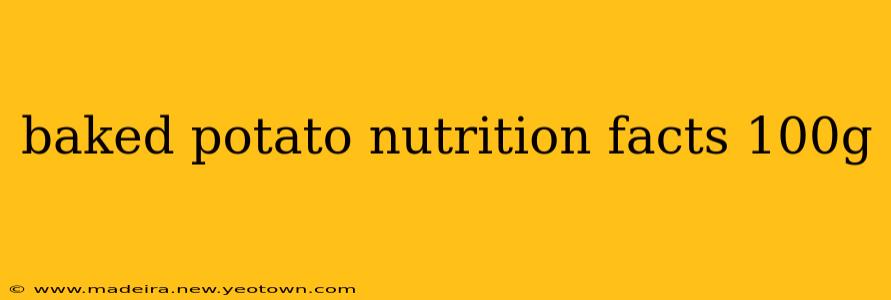Baked Potato Nutrition Facts: A Tuber of Truth (100g Serving)
Let's peel back the layers and uncover the nutritional secrets hidden within that humble baked potato. It’s more than just a fluffy side dish; it's a nutritional powerhouse packed with vitamins, minerals, and fiber. But just how nutritious is a 100g serving? Let's dive into the details.
A standard baked potato, weighing around 200g, provides a hearty meal, but focusing on a 100g serving allows for easier portion control and clearer understanding of its nutritional makeup. We'll explore the nutritional profile, address common questions, and bust some myths surrounding this versatile vegetable.
What are the macronutrients in a 100g baked potato?
A 100g serving of a baked potato (without added butter, sour cream, or toppings) typically contains approximately:
- Calories: 77-86 calories (this can vary slightly depending on the potato variety and growing conditions).
- Carbohydrates: 17-20 grams, predominantly complex carbohydrates providing sustained energy.
- Protein: 2-3 grams. While not a primary protein source, it still offers some contribution.
- Fat: 0.1-0.3 grams – naturally very low in fat.
What are the micronutrients in a 100g baked potato?
Beyond the macronutrients, baked potatoes shine with their impressive micronutrient profile:
- Potassium: A significant source, contributing to healthy blood pressure and fluid balance.
- Vitamin C: An important antioxidant, boosting immunity and collagen production.
- Vitamin B6: Crucial for brain development and function.
- Magnesium: Essential for muscle and nerve function, blood sugar control, and blood pressure regulation.
- Fiber: A good source of dietary fiber, promoting digestive health and satiety. This helps regulate blood sugar levels and prevents constipation.
How many carbs are in a 100g baked potato?
As mentioned above, a 100g baked potato contains approximately 17-20 grams of carbohydrates. It's important to note that these are primarily complex carbohydrates, which are digested more slowly than simple sugars, leading to a more gradual release of energy and preventing blood sugar spikes.
Is a baked potato good for weight loss?
Because of its relatively low calorie count and high fiber content, a baked potato can be part of a healthy weight loss diet. The fiber promotes fullness, keeping you feeling satisfied for longer and potentially reducing overall calorie intake. However, the addition of high-calorie toppings like butter, cheese, sour cream, and bacon can significantly increase the calorie content, negating the potential weight loss benefits. Stick to healthier toppings like salsa, chives, or a sprinkle of low-fat cheese for a more weight-conscious option.
Are baked potatoes good for diabetics?
Baked potatoes can be a part of a diabetic-friendly diet, but moderation and careful portion control are key. The high carbohydrate content needs to be balanced within the overall daily carbohydrate allowance prescribed by a doctor or registered dietitian. Focus on portion size and avoid high-glycemic index toppings. The fiber in the potato helps slow down the absorption of sugar into the bloodstream.
What are the benefits of eating a baked potato?
The benefits extend beyond the specific nutrients:
- Digestive health: The high fiber content aids digestion and prevents constipation.
- Heart health: Potassium contributes to maintaining healthy blood pressure.
- Energy levels: Complex carbohydrates provide sustained energy.
- Nutrient density: Provides a wide range of essential vitamins and minerals.
Conclusion:
The humble baked potato, when enjoyed in moderation and without excessive toppings, offers a surprising amount of nutritional value. Understanding its nutritional profile empowers you to make informed choices and incorporate this versatile vegetable into a balanced and healthy diet. Remember, always consult with a healthcare professional or registered dietitian for personalized dietary advice, especially if you have specific health concerns.

